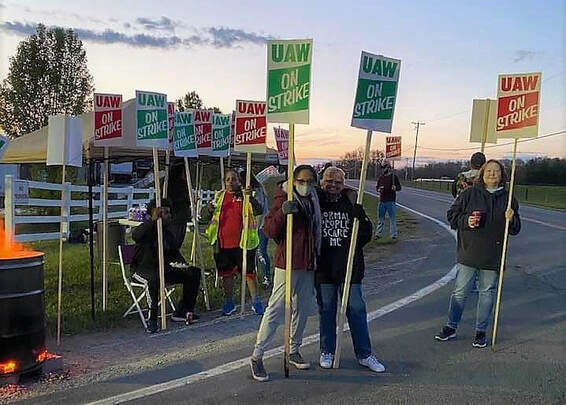|
4/25/2021 3,000 Workers Are On Strike at the Largest Volvo Truck Manufacturing Plant in the World. By: James Dennis HoffRead NowWorkers at the Mack and Volvo Truck of North America manufacturing plant in Dublin, Virginia — which makes regional and long distance hauling vehicles for the entire country — have been on strike for almost a week now and show no signs of backing down. Photo: UAW 2069 Last week workers at Volvo’s New River Valley Plant in Dublin, Virginia — the largest truck manufacturing facility in the United States — downed their tools and walked off the job. Since then, almost 3,000 members of United Auto Workers (UAW) local 2069 have taken up picket lines around the plant, demanding higher wages, extended health benefits for retirees, safer working conditions, and an end to the multi-tier wage system that allows new hires to make as little as half the wages of more senior workers. The walkout, which began April 17, follows a successful strike vote passed in February just before the expiration of the last contract. That strike was delayed, however, when the UAW leadership — seemingly against the wishes of the rank-and-file members who voted overwhelmingly (98.6 percent) to strike — agreed to a month-long extension of negotiations. Many workers complain this extension was a conscious decision on the part of the business union leadership to allow Volvo more time to prepare to weather both a strike, as well as a massive nationwide semiconductor shortage. An earlier strike in late February or March would have put more pressure on management to make concessions. In fact, freight industry news outlets are reporting that the strike now may actually help Volvo move chips to other plants around the world, thereby reducing overall downtime. As one anonymous worker at the plant told Left Voice: “We all knew the chip shortage would affect production and knew there would be three to six months down time to get them. So the company needed us to go out.” While even long-time workers at the manufacturing plant are being paid as little as $16 an hour, Mack and Volvo Truck of North America (VTNA), which is owned by Volvo Group, continues to make massive earnings. Last year, thanks to the pandemic, VTNA saw reductions in new truck orders, but still posted more than $3 billion in profits. This year, however, orders have increased dramatically and class 8 truck orders are up more than 242 percent over 2020. This high demand will mean even greater profits for VTNA in 2021. Workers on the picket lines say they expect to see a share of this new wealth and that they are determined to stay out as long as it takes to win higher wages and safer working conditions during the pandemic. “No matter how long we need to stay we will get it or they can hire 3,000 more people, because in the last few years they had trouble finding 1,000” said one worker. While workers are currently being issued strike pay from the UAW national strike fund, they are unsure whether Volvo will continue to honor their health insurance, since their contract expired in February. Cutting health insurance for striking workers has been used by bosses to break or weaken their resolve, and was a tactic used as recently as the UAW Chrysler strike in 2019. This practice would remain legal even if the PRO Act were to miraculously pass the Senate. Among the many demands put forward by the union, the issue of the multi-tier wage system is one that workers say they are especially concerned about. Such multi-tier wage systems have been a powerful weapon against workers that have allowed the auto industry, often abetted by union bureaucracies like the UAW, to chip away at decades of hard won wage gains. This wage system has more recently allowed multinational companies like Volvo to ramp up production by hiring more low-paid workers, while squeezing out higher earners and making billions in additional profits. Such wage disparities also tend to have a debilitating effect on union solidarity, often weakening union power by pitting one group of workers against another, which is exactly what the bosses want. In addition, workers are asking that the company fund health insurance for retirees, who currently have to begin paying for their insurance when they retire, leading many to indefinitely postpone retirement. This strike also comes amid a sharp increase in strikes of more than 1,000 employees across the country. From coal miners in Alabama, to Massachusetts nurses and Columbia graduate workers, there have already been more strikes this year than the entire first half of 2020, signaling that 2021, like 2019, could be a banner year for major work stoppages. As the economy recovers from the low point of the economic crisis, and as demand for manufacturing and logistical labor in particular increases, workers, many of whom have suffered greatly due to the pandemic, may be more willing to take on the boss even when their unions are not. Indeed, it’s clear that the strike at Volvo was driven by the anger of the frontline workers themselves and that bureaucracy is being pulled forward by the rank and file. Currently the union says it will not engage in any further negotiations until April 26. But if the spirit on display on the picket lines is any indication of the resilience of these workers to keep fighting, there is a strong chance they may win many of their demands. AuthorJames Dennis Hoff is a writer, educator, and activist. He teaches at The City University of New York. This article was first published by Left Voice.
0 Comments
Leave a Reply. |
Details
Archives
July 2024
Categories
All
|

 RSS Feed
RSS Feed